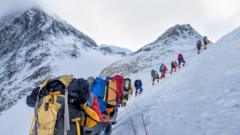As of September, the cost to scale Everest during peak season will be $15,000, up from $11,000. Fees will also rise for off-peak seasons, costing $7,500 from September to November and $3,750 from December to February.
The decision to adjust these fees comes as the Nepalese government seeks to manage the growing number of climbers, which experts say has led to dangerous overcrowding on the mountain. The increasing income from these permits plays a crucial role in supporting Nepal's economy, which relies heavily on trekking and mountaineering.
In 2024, the Supreme Court instructed the government to limit the number of permits issued, acknowledging the need to maintain the mountains’ capacity. Despite administrative attempts to improve conditions, Everest is often criticized as a "garbage dump," with numerous clean-up efforts revealing tons of waste and even human remains. The future of Everest climbing is uncertain as these measures and fees come into play.
The decision to adjust these fees comes as the Nepalese government seeks to manage the growing number of climbers, which experts say has led to dangerous overcrowding on the mountain. The increasing income from these permits plays a crucial role in supporting Nepal's economy, which relies heavily on trekking and mountaineering.
In 2024, the Supreme Court instructed the government to limit the number of permits issued, acknowledging the need to maintain the mountains’ capacity. Despite administrative attempts to improve conditions, Everest is often criticized as a "garbage dump," with numerous clean-up efforts revealing tons of waste and even human remains. The future of Everest climbing is uncertain as these measures and fees come into play.





















